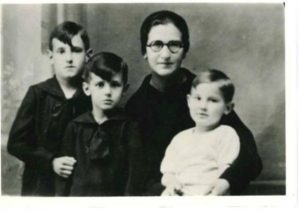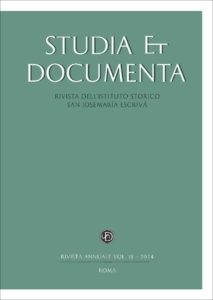Luka Brajnovic with Ana Tijan, when they were dating, in 1942.
Álvaro d’Ors with Blessed Álvaro del Portillo, in 1976.
Aurora Nieto, one of the first supernumeraries of Opus Dei, in a photo from 1945.
Ruth Pakaluk, during an excursion to the mountains.
The Istituto Storico San Josemaría Escrivá has just published volume 18 (2024) of the journal “Studia et Documenta”. This new volume presents several research articles on the supernumerary members of Opus Dei, both male and female, as well as studies, notes and documents that explore various aspects of the history of the Institution.
The monographic section is a collection of eight reports on the supernumeraries of Opus Dei, presenting some personal experiences and the impact of their particular circumstances.
Brief biographies of two supernumeraries from different social and religious backgrounds are included: Maria Eugenia Ibarguren de Gallardo (1939-1996) from Argentina and Ruth Pakaluk (1957-1998) from the United States. They had a number of characteristics in common: they were both mothers of big families, they gave themselves generously to altruistic causes and they serenely accepted, while they were still young, illness and death. These biographies are authored by the historians Milagros Gallardo and John Coverdale, respectively.
Alfredo Méndiz examines the activities of Tomás Alvira, one of the first supernumeraries of Opus Dei, as director of the Infanta María Teresa School for orphans of the Civil Guard, between 1950 and 1957. The article highlights how Alvira improved the living conditions of those students, who lacked affective and formative support.
The philosopher and writer Francisco Santamaría offers a biographical sketch of the Asturian businessman Luis Adaro. This first supernumerary from Gijón undertook many initiatives for the benefit of his local region. The historian Ana Escauriaza writes about Aurora Nieto, a supernumerary from Salamanca. Aurora was a widow and mother of three children, whose home was an important center of apostolate for young people in that city.
The article by Professor Dario Casapiccola explores the incorporation of supernumeraries in Buenos Aires and Rosario during the years of the arrival of the Work in 1950 through to 1961. Luis Cano analyzes the group of people who attended the retreat course preached by St. Josemaría in Molinoviejo during Holy Week in 1949. María Luisa Galdón and Julio Montero look at the first retreats organized for Spanish female supernumeraries between 1952 and 1957.
The Studi e Note section features five studies that explore various aspects of the history of Opus Dei. Three of these studies focus on the growth of the Institution in different geographical regions: Federico M. Requena examines the activities of Opus Dei in Washington between 1957 and 1961; Cosimo di Fazio investigates the first expansion of Opus Dei in Italy in 1949; and Eliana Fucili looks at the first steps of the apostolate with women in Argentina. Meanwhile, José Luis González Gullón investigates the names and surnames of the founder of Opus Dei. Finally, Santiago Martínez deals with the secular clerical institutes during the pontificate of Pius XII.
In the Documenti section, María Jesús Coma and María Eugenia Ossandón present and annotate the second issue of the series of newsletters called Noticias (News). While living in Burgos during the Spanish Civil War, the founder of Opus Dei wrote a sort of monthly family newsletter, in which he offered a message of encouragement to the young people who had come into contact with the Work in order to keep their faith alive. The second newsletter, the largest in the series, was written in 1938, and was sent out to 50 people.
In the Notiziario section, Julio Montero outlines the project of relating the history of the Tajamar school in Madrid. This teaching initiative first emerged as an educational service in a specific area and at a specific time: the Madrid neighborhood of Vallecas, in the mid-1950’s. Its promoters wanted to bring education to a neighborhood that lacked the most elementary resources and to provide Christian education programs to those who so desired.
The Sezione bibliográfica completes the journal. This section includes reviews and bibliographical reviews and a listing of publications about Opus Dei prelates Álvaro del Portillo, Javier Echevarría and Fernando Ocáriz, between 2014 and 2017.






